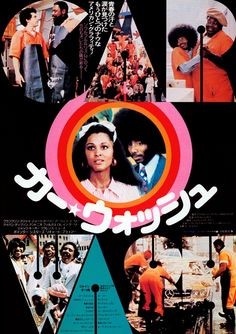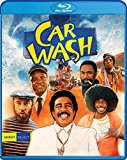| Reviews & Columns |
|
Reviews DVD TV on DVD Blu-ray 4K UHD International DVDs In Theaters Reviews by Studio Video Games Features Collector Series DVDs Easter Egg Database Interviews DVD Talk Radio Feature Articles Columns Anime Talk DVD Savant Horror DVDs The M.O.D. Squad Art House HD Talk Silent DVD
|
DVD Talk Forum |
|
|
| Resources |
|
DVD Price Search Customer Service #'s RCE Info Links |
|
Columns
|
|
|
Car Wash
African-American filmmaker Michael Schultz directed. Bucking the conventions of the waning Blaxploitation genre, Schultz's early films were the kind of black-centric movies that should have been made from the start. Cooley High (1975) remains one of the high watermark movies of the ‘70s, but rather like Philip Kaufman's The Wanderers (1979) stubbornly seems condemned to cult movie status. Car Wash was a substantial hit, and his next two features, Greased Lightning and Which Way Is Up? (both 1977, both starring Richard Pryor) did well enough that Universal entrusted Schultz to the big-budgeted Sergeant Pepper's Lonely Hearts Club Band (1978), a what-were-they-thinking? big studio disaster that derailed Schultz's career for a time until he found steady work on television.
Car Wash was a high point, made during a fleeting moment when companies like Universal particularly actively supported movies primarily featuring black Americans. (Another such film, The Bingo Long Traveling All-Stars & Motor Kings, a Motown Production, was released earlier that same year.) Though some advertising misleadingly emphasized Richard Pryor's one-scene part, it's an ensemble piece with precious little story per se; the feel of the picture is closer to Robert Altman's Nashville (1975) and other Altman movies from that period.
The workers at the car wash are predominantly African-American (including one cross-dressing homosexual), but there are several Latinos, a Native American, and a white cowboy type. The owner, Mr. B (Sully Boyar), predictably, is white.
The biggest stars of Car Wash make the least interesting characters. Richard Pryor plays a typically money-obsessed evangelist named Daddy Rich. Appearing onscreen for about five minutes along with The Pointer Sisters, his function is mainly to disgust car washer Duane (Bill Duke). Tortured by the daily grinds of poverty and his dead end job, the increasingly desperate Duane has become a Black Muslim revolutionary, changing his name to Abdullah.
The other marquee name in Car Wash is George Carlin, playing a taxi driver who spends the entire film looking for a black hooker, Marleen (Lauren Jones) who stiffed him mid-ride. Carlin reportedly wrote his own dialogue, but it's a nothing part.
The more memorable scenes in Car Wash revolve around Lonnie (Ivan Dixon, in his last movie role before becoming a director full-time), a gravelly-voiced ex-con on tenuous parole. With two kids to support, the cigar-chomping foreman of the car wash has been asking Mr. B for a raise for months but the tight-fisted owner keeps putting him off. The best moments in the film come at the very end: a confrontation between the militant, angry Abdullah and the world-weary, frustrated Lonnie.
Car Wash keeps things relatively light most of the time, however. The workers enjoy playing practical jokes on one another, and dance to the disco and soul music piped over the P.A. system. The customers are often eccentric and, in turn, entertain the men as they work. A rich lady (Lorraine Gary) from Beverly Hills driving a Mercedes-Benz hysterically implores them to clean her son's vomit from the car door before it ruins the paint. In another scene an eccentric little old man ("Professor" Irwin Corey) is mistaken for the "pop bottle bomber" but is actually filling one with urine ahead of a medical exam.
These and other vignettes all have an authentic air. By the end of the film, Schultz creates a genuine workplace environment that's entirely believable.
Video & Audio
A Shout! Factory released licensed from Universal, Car Wash gets a bright, detailed 1080p and 1.85:1 widescreen transfer with DTS-HD Master Audio 2.0 mono. English subtitles are offered on this Region "A" disc.
Extras
The good supplements kick off with an audio commentary by director Schultz, repurposed from an earlier UK Blu-ray. New to the format are two featurettes, "Car Wash from Start to Finish," an interview with producer Gary Stromberg who is unusually frank about his own personal problems that plagued his career; and "Workin' at the Car Wash," an interview with actor Otis Day (who plays "Lloyd" in the film, a relatively minor character). Radio spots and, sadly typical for Universal, a full-frame trailer in poor condition, are also included.
Parting Thoughts
Entertaining and worthwhile, Car Wash is Highly Recommended.
Stuart Galbraith IV is the Kyoto-based film historian largely absent from reviewing these days while he restores a 200-year-old Japanese farmhouse.
|
| Popular Reviews |
| Sponsored Links |
|
|
| Sponsored Links |
|
|
| Release List | Reviews | Shop | Newsletter | Forum | DVD Giveaways | Blu-Ray | Advertise |
|
Copyright 2024 DVDTalk.com All Rights Reserved. Legal Info, Privacy Policy, Terms of Use,
Manage Preferences,
Your Privacy Choices | |||||||














